
Joyce Hayes |
|
How to shoot eagles in flight
|
|
|
|
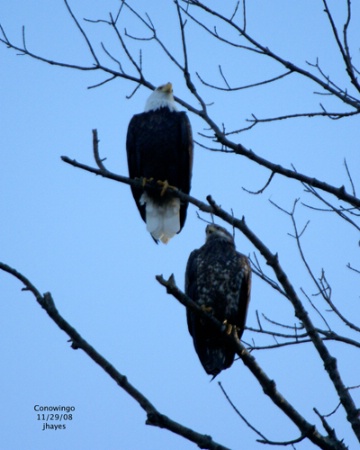
Pair perched
Its a little easier when the birds pose for pictures. This was in shade in the afternoon. Aperature was set at 22. Again Sony alpha with sigma 170-400 zoom.
Joyce Hayes
|
|
|
|
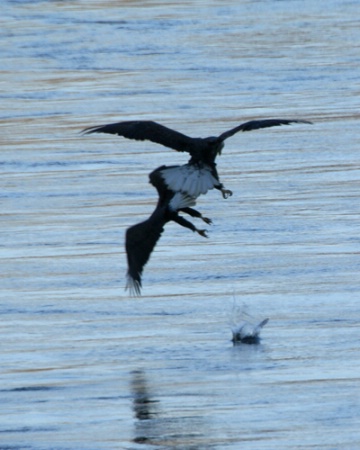
Fish dropped
Shutter speeed was 5oo with the zoom on the sigma 170-500 fully engaged. Note the fish dropping in the water.
Joyce Hayes
|
|
|
|
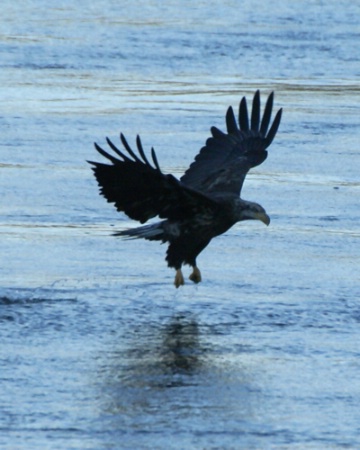
Fishing
Same conditions. Shade. Shutter speed 500. Full zoom on the Sigma 170-500.
Joyce Hayes
|
|
|
|
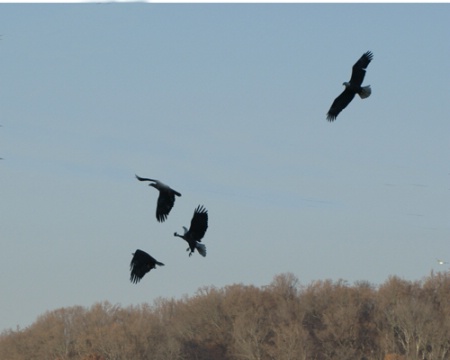
aerial acrobatics 1
Sony alpha with sigma 170-500 zoom. I love the shot, I just wish it were crisper. Again I had the shutter speed at 500 and the aperature was a good as the lens allows, as far as I know. any suggestions.
Joyce Hayes
|
|
|
|
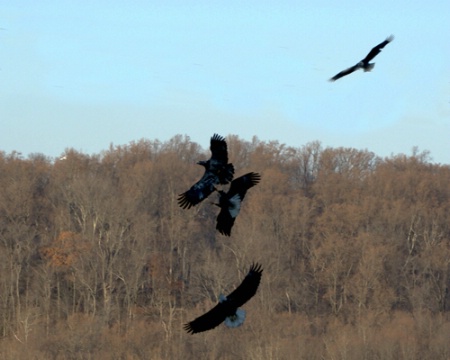
Aerial acrobatics 2
Same comment and questions
Joyce Hayes
|
|
|
|
I use a sony alpha 100 with a sigma 170-500 zoom on a monopod that allows me to move. I do alright with the eagles perched in the trees and those that fly close by, but I am not getting the crispness I would like for the aerial combats. Unfortunately the lens goes to a 6.3 aperature when fully extended. I had the shutter speed set at 500, the iso at 200 but used auto white balance. Any suggestions for getting crisper pictures would be appreciated. Thanks. Joyce
November 30, 2008
|
|
|
BetterPhoto Member |
|
I would bump your ISO higher. With a lens of 500mm, you're going to need a faster shutter speed to make the capture.
November 30, 2008
|
|
|
Mary Iacofano |
|
shoot in aperture priority mode. wide open aperture with a high iso. maybe more than 200. try 300-400 and see how the noise factor is with your camera. take your ap to your lowest number possible. 4.5 or 5.6, etc.
November 30, 2008
|
|
|
Sharon Day |
|
How fast a shutter speed do you need? I was shooting eagles and geese Friday and was shooting at 1/250th thinking that would be fast enough but it wasn't. Thanks!
November 30, 2008
|
|
|
Mary Iacofano |
|
|
|
|
|
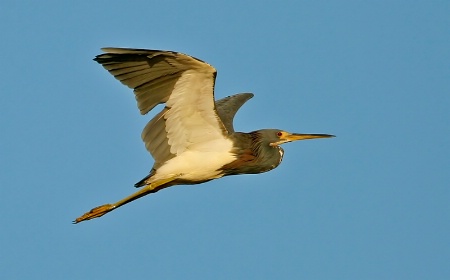
Tri-colored Heron in Flight
Mary Iacofano
|
|
|
|
this image was taken in AV mode, F5.6, iso 400, 1/2000", 400mm.
November 30, 2008
|
|
|
Mary Iacofano |
|
|
|
|
|

Roseate Spoonbillin flight
Mary Iacofano
|
|
|
|
This image was taken in AV mode, F5.6, 1/1600", iso 200, 300mm.
November 30, 2008
|
|
|
Sharon Day |
|
Thanks, Mary! They are very nice! Do you have a hard time nailing the focus? I tried shooting (for the first time) a big bird in flight last Friday. I had trouble getting the focus while panning as well. It's going to take me a lot of practice, I think.
November 30, 2008
|
|
|
Pete H |
|
Joyce, One of the problems I see is your metering.
It appears you are allowing your camera to make a decision here. The birds are too dark. You are metering for the sky and not the birds. The sky will fool your meter. Just shoot some test shots to get the birds exposed better..lock that setting in using manual mode and shoot away. Next, unless you can get fairly close to these birds in flight; even with 500mm; quality glass is the key.
I hate to burst your bubble, but f/6.3 just doesn't cut it for high quality wildlife shots. This does not mean you can't get good shots..just don't expect to replicate photos you see in wildlife magaines.
Pete
November 30, 2008
|
|
|
John G. Clifford Jr |
|
|
|

|
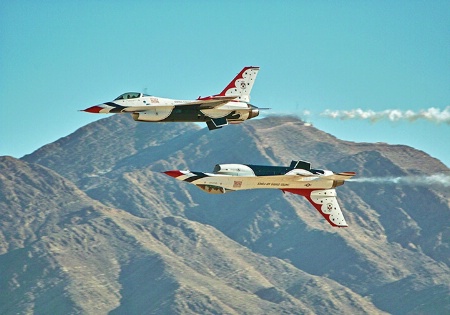
Over And Under
Sigma SD14, Sigma 300/4 APO (manually focused), 1/1250 @ f/5, ISO 100The solos making a pass at Nellis AFB during Aviation Nation 2007.
John G. Clifford Jr
|
|
|
|
I've shot mostly airplanes in flight, but the principles are the same.You have to get a fast-enough shutter speed to stop any motion blur that otherwise might occur. That means you often have to shoot at higher ISOs, especially when your lens' max aperture is f/6.3. Between your monopod, 500mm of focal length, and fast-moving subjects, 1/500 just isn't cutting it. You should be at ISO 400 or ISO 800 to get the shutter speed up there. Ask yourself... is it better to get an in-focus, sharp picture with a little bit of grain, or a beautiful, smooth, blurred picture? Speaking of aperture, it's hard to get exact focus on something moving... but you will be better at this than your camera. I nearly always shoot in manual focus mode. I also try to shoot at one to two stops below max aperture, e.g, f/8 or f/9.5 with your lens, f/5.6 to f/8 with my lens. The extra depth of field helps with slight focusing errors, and besides with a long lens the plane of focus is pretty darn narrow. And, as Pete pointed out, the light(er) sky is fooling your camera's exposure meter, and you need to add a stop or two to your exposure in order to capture the detail of the birds' feathers, etc. In short, I have to agree with Pete... your lens is not optimal for bird-in-flight photos. Doesn't mean it can't be done, but be prepared to have to take a large number of shots to get a few keepers, and be prepared to miss those 'once in an afternoon' shot opportunities.
November 30, 2008
|
|
|
Joyce Hayes |
|
Thank you all. I will try using a a higher ISO and faster shutter speed as well as trying to lock my light meter on a darker segment before trying to catch the birds against the sky. I do that when they're stationary but it's tough with the action shots. As an amateur birder and photographer, this is the best equipment I can afford so I'll do the best I can with what I've got. Thanks for the advice. I'll post more pictures when I get better ones. Joyce
December 01, 2008
|
|
|
Pete H |
|
"lock my light meter on a darker segment before trying to catch the birds against the sky. I do that when they're stationary but it's tough with the action shots." Joyce, Shutter speed is one thing; exposure is another.
Once you have the correct exposure for the birds, you lock that in using full manual. It makes no difference if they are flying or stationary. That being said, if you are wide open in aperture and your speed is 1/60th; you will get correctly exposed birds, but they will no doubt suffer from subject blur AND camera movement. I think I have a seagull pic in my gallery. I was actually just testing my new camera's dynamic AF; but...If you notice, it was a bright sunny day.
I got my meter reading while the gulls were on the ground; so it makes no difference in exposure if they are flying or not.
I was also fairly close to the gull, maybe about 50 yards. You will of course have to adjust your exposure as the day wears on or if lighting conditions change.
Pete
December 01, 2008
|
|
|
Joyce Hayes |
|
Thanks Pete. I do know there is a difference between shutter speed and exposure. Because my subjects and I both move and change -- full shade to full sunlight I haven't tried a manual exposure lock. My camera allows me to focus on something and then lock the exposure, then shift refocus and take the picture. I will however try a manual lock the next time I go out to experiment with it. Thanks again. Joyce
December 02, 2008
|
|
|
|
Log in to respond or ask your own question.
|